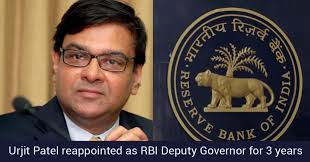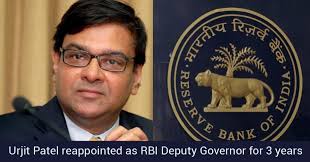
Indian Prime Minister Narendra Modi sought someone who would cement credibility with international investors without upsetting his political base in promoting Deputy Governor Urjit Patel to lead India’s central bank. Both were successfully managed by Raghuram Rajan who steps down on Sept. 4.
Including efforts of implementing an inflation target and cleaning up debt-saddled banks, Patel has helped Rajan spearhead the biggest reforms to India’s central bank in its 81-year history for the past three years. Patel’s style is much different even though they worked hand-in-hand. Patel - the 52-year-old, rarely speaks in public and gives few media interviews.
“The differentiating factor is of course the personality of Rajan versus that of Patel. Rajan was an extrovert and outgoing and he was very categorical in his opinion. That may not be the case with Patel, but I think with more experience and exposure he’ll also become more active," said Anjali Verma, an economist at PhillipCapital Ltd. in Mumbai.
It was Rajan’s forays on the nation’s social ills that made him a political threat to Modi even as Rajan raised India’s profile by speaking out regularly against unconventional monetary policy in the U.S. and elsewhere. Rajan called for religious tolerance at a time when Modi faced criticism for his silence after a Muslim man was murdered for allegedly eating beef and lambasted "venal politicians" in speeches.
Neither Patel not the RBI had immediate statement on the appointment.
The appointment of Patel is a relief for markets. While the continuity that the hawkish Patel brings signals that Modi will maintain a focus on macroeconomic stability that has helped make India the world’s fastest-growing major economy, interest-rate swaps in recent months indicated that investors were betting on a more dovish governor.
“Patel’s appointment will be comforting. An outsider would have taken more time to settle down. With Patel the transition will be seamless," Sampath Reddy, chief investment officer at Bajaj Allianz Life Insurance Co., which has $6.5 billion in assets, said.
Cleaning up 8 trillion rupees ($119 billion) of stressed assets at banks and implementing a monetary policy committee are Rajan’s two unfinished tasks that Patel will be able to help out with.
Legally mandated to keep consumer-price inflation at the target of 4 percent, plus or minus two percentage points, the new rate-setting panel is set to be formed in the coming months. There’s not much room for further cuts to that end. Rising the most in 23 months, the upper bound of the RBI’s target range was breached by consumer prices in July.
One of the key reasons Rajan had pushed for the MPC was immunity from political pressure and the MPC will inherently have that quality. Calls to lower rates from politicians in New Delhi have been routinely faced by central bank governors in the financial capital of Mumbai and that’s a big shift in India.
Rajan, resisted demands to lighten up on the need for lenders to provision for bad loans and it’s unclear if Patel will be as rigid as Rajan on the bank clean-up.
“Though markets may view him as inflation focused, it’s positive for banks," Chakri Lokapriya, Mumbai-based chief investment officer at TCG Advisory Services Pvt., said.
(Source:www.bloomberg.com)
Including efforts of implementing an inflation target and cleaning up debt-saddled banks, Patel has helped Rajan spearhead the biggest reforms to India’s central bank in its 81-year history for the past three years. Patel’s style is much different even though they worked hand-in-hand. Patel - the 52-year-old, rarely speaks in public and gives few media interviews.
“The differentiating factor is of course the personality of Rajan versus that of Patel. Rajan was an extrovert and outgoing and he was very categorical in his opinion. That may not be the case with Patel, but I think with more experience and exposure he’ll also become more active," said Anjali Verma, an economist at PhillipCapital Ltd. in Mumbai.
It was Rajan’s forays on the nation’s social ills that made him a political threat to Modi even as Rajan raised India’s profile by speaking out regularly against unconventional monetary policy in the U.S. and elsewhere. Rajan called for religious tolerance at a time when Modi faced criticism for his silence after a Muslim man was murdered for allegedly eating beef and lambasted "venal politicians" in speeches.
Neither Patel not the RBI had immediate statement on the appointment.
The appointment of Patel is a relief for markets. While the continuity that the hawkish Patel brings signals that Modi will maintain a focus on macroeconomic stability that has helped make India the world’s fastest-growing major economy, interest-rate swaps in recent months indicated that investors were betting on a more dovish governor.
“Patel’s appointment will be comforting. An outsider would have taken more time to settle down. With Patel the transition will be seamless," Sampath Reddy, chief investment officer at Bajaj Allianz Life Insurance Co., which has $6.5 billion in assets, said.
Cleaning up 8 trillion rupees ($119 billion) of stressed assets at banks and implementing a monetary policy committee are Rajan’s two unfinished tasks that Patel will be able to help out with.
Legally mandated to keep consumer-price inflation at the target of 4 percent, plus or minus two percentage points, the new rate-setting panel is set to be formed in the coming months. There’s not much room for further cuts to that end. Rising the most in 23 months, the upper bound of the RBI’s target range was breached by consumer prices in July.
One of the key reasons Rajan had pushed for the MPC was immunity from political pressure and the MPC will inherently have that quality. Calls to lower rates from politicians in New Delhi have been routinely faced by central bank governors in the financial capital of Mumbai and that’s a big shift in India.
Rajan, resisted demands to lighten up on the need for lenders to provision for bad loans and it’s unclear if Patel will be as rigid as Rajan on the bank clean-up.
“Though markets may view him as inflation focused, it’s positive for banks," Chakri Lokapriya, Mumbai-based chief investment officer at TCG Advisory Services Pvt., said.
(Source:www.bloomberg.com)














